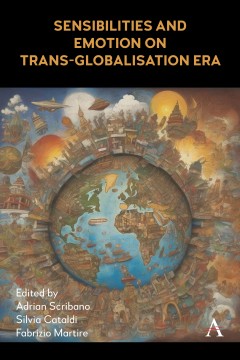Sensibilities and Emotion on Trans-Globalisation Era
Edited by Adrian Scribano
Silvia Cataldi
Fabrizio Martire
Other Formats Available:
- About This Book
- Reviews
- Author Information
- Series
- Table of Contents
- Links
- Podcasts
About This Book
The Pandemic, the wars, the crisis of political institutions, and the expansion of the intensive use of social networks have impacted the elaboration of phantoms and fantasies that emerge from the modifications of the politics of the bodies and politics of emotions: today—what more than never?—the sensibilities are changing on a global scale.
Emotions and politics of sensibilities registered in the current process of colonization of the inner planet imply the urgency of relieving the forms that its impacts acquire in the daily life of a global scale that becomes trans-globalization.
Trans-globalization is characterized by the modification of three basic features of the structuring processes on a planetary scale: (a) the unnoticed acceptance of the global extension of the banalization of the good, the politics of perversion, and the logic of waste; (b) the return of the question/tension/paradox of sovereignty as a physical device for international mediation of virtual transnational commodification; and (c) the acceleration of the so-called energy transition.
Reviews
‘Sensibilities and Emotion on Trans-Globalisation Era is a timely and profound exploration of the evolving complexities in our interconnected world. Through an interdisciplinary approach, the text illuminates the fragile interplay of gender, age, ethnicity and class, offering crucial insights into the shifting dynamics of global inequalities with a focus on sensibilities and emotions, crucial elements of our sociocultural worlds, relations and experiences. It is a must-read for anyone seeking to understand contemporary sociocultural trends and transformations’ — Begonya Enguix Grau, Professor of Social and Cultural Anthropology, Universitat Oberta de Catalunya (UOC)
‘Sensibilities and Emotion on Trans-Globalisation Era is a very interesting book with accurate content that prompts readers to contemplate the intricate relationship between the politics of sensibilities and emotions in the era of digital transglobalisation. It is a valuable scientific resource that contributes significantly to the study of transglobalisation and the politics of sensitivities’ — Marco Palmieri, Department of Communication and Social Research, University of Rome
Author Information
Adrian Scribano is the Director of the Centre for Sociological Research and Studies and a Principal Researcher at the National Council for Scientific and Technical Research of Argentina. He is also the Director of the Latin American Journal of Studies on Bodies, Emotions, and Society. He is Chercheur Associé LEIRIS Paul Valéry Montpellier 3 au Département de sociologie de l’UFR 5 and Adjunct Professor at Torrens University Australia.
Silvia Cataldi is an Associate Professor of sociology at the Department of Development and Socialization processes of Sapienza University of Rome (Italy). Since her PhD, she teaches sociology and research methods at bachelor’s and master’s degree courses and doctoral schools. She addresses her research on solidarity actions, with a focus on the empowerment of most vulnerable targets and prison environment, through projects financed by the European Commission. She is the coordinator of the International Sociological Association’s TG12 Social Love and Solidarity, board member of the European Sociological Association’s Research Network—Qualitative Methods (RN20), and coordinator of the international research network Social-One.
Fabrizio Martire (PhD) is Full Professor of Sociology at the Department of Communication and Social Research, Sapienza University of Rome. Among his main scientific interests are sociological theory, history of sociology and social research, methodology of social research (with a specific focus on data collection strategies and techniques), public opinion analysis, and evaluation (with a specific focus on quality of social research outputs). On these issues he has organized and supervised several scientific projects, publishing almost 80 essays (monographs, edited volumes, articles in Italian and international journals, chapters). He is a member of the Advisory Board of the Research Network—Quantitative Methods (RN21) of the European Sociological Association (since 2019). Since 2021, he is the Director of the BA program in “Communication, technologies and digital cultures” at Sapienza University of Rome.
Series
Table of Contents
Preface: Sensibilities at the Turn of the Twentieth Century —Maximiliano E. Korstanje; 1. Towards a Theory of Trans-globalisation from the Politics of Sensibilities—Adrian Scribano; WORK, LABOUR AND EMOTIONS, 2. ‘Freedom of Platforms’: Conflict, Bodies and Emotions in the Work of Riders (Argentina) —Pedro Lisdero; 3. Emotion, Power and Counterpower: An Anthropological Perspective from the Movement from the Right of Housing in Rome (Italy)—Osvaldo Costantini; IMAGES, EMOTIONS AND SENSIBILITIES, 4. Migrants, Images and Emotions at the Petronio Álvarez Pacific Music Festival in Cali, Colombia— Paola Andrea Cano Molina and Juan Antonio Roche Cárcel; 5. How the Pandemic Still Speaks to Us: Towards a Sociology of Images and Emotions— Marina Ciampi; YOUNG PEOPLE AND SENSIBILITIES, 6. Individualised but Not Individualist: Young People’s Experiences of Sociation and Cooperative Individualisation in Milan—Enzo Colombo and Paola Rebughini; 7. Exploring Youth and Education: Between Sociological Tradition, Field Research and Public Engagement— Gennaro Iorio and Maurizio Merico; CONSUMPTION, SOCIETY AND SENSIBILITIES, 8. Between Consumer Change and New Awareness: Dealing with Emotions during the COVID-19 Lockdown—Geraldina Roberti; 9. ‘It Never Rains but It Pours’. Social Policies between the Lack and the ‘Not Enough’—Angélica De Sena and Andrea Dettano ; Conclusions: Beyond the Boundaries of Emotion—Silvia Cataldi and Fabrizio Martire; Index
Links
Stay Updated
Information
Latest Tweets



